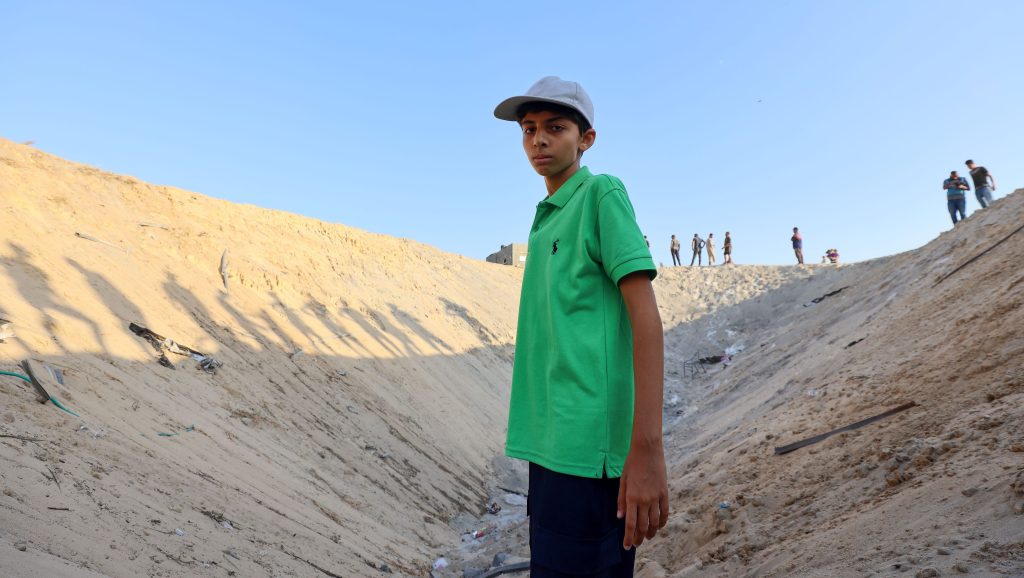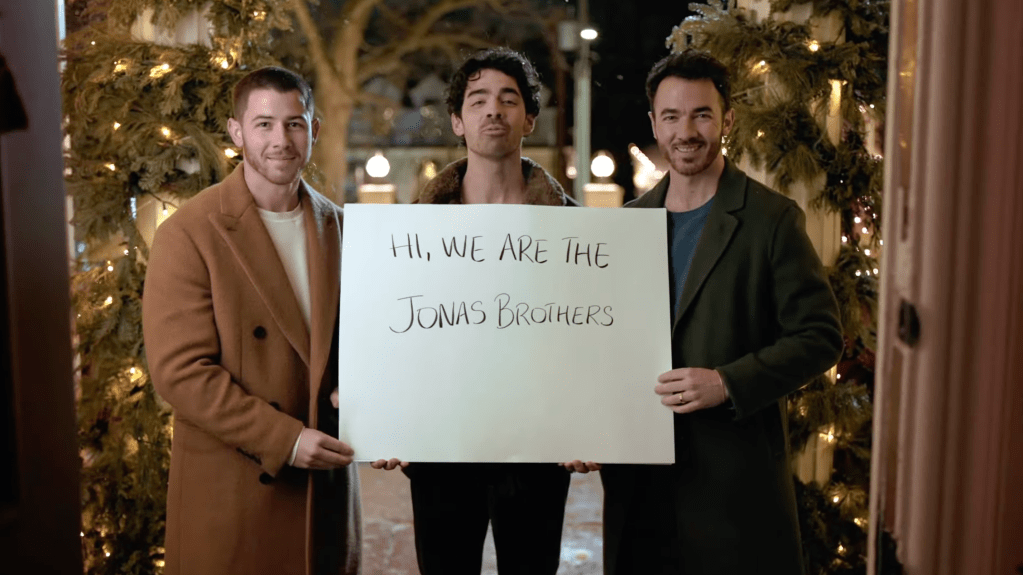The BBC has apologized and added a clarification to its Gaza: How To Survive a Warzone documentary that featured the son of Hamas royalty, after nearly 50 entertainment figures sent a letter to the corporation to urge an investigation.
The BBC “had not been informed of this information” by the independent producers behind the doc, the corporation added, following backlash from dozens of senior entertainment figures including former BBC controller Danny Cohen, J.K. Rowling’s agent Neil Blair, agent Anita Land and ex-Got Talent commissioner Claudia Rosencrantz.
The letter was sent to Director General Tim Davie, content chief Charlotte Moore and BBC News boss Deborah Turness earlier today, urging an investigation after the documentary about children in Gaza that failed to declare that the lead contributor was the son of Hamas royalty.
In a statement in the past few minutes, the BBC said that since the transmission of the doc three days ago it had “become aware of the family connections of the film’s narrator, a child called Abdullah.” “We’ve promised our audiences the highest standards of transparency, so it is only right that as a result of this new information, we add some more detail to the film before its retransmission,” the statement added. “We apologise for the omission of that detail from the original film.”
For future repeats and on iPlayer, the film will now clarify: “The narrator of this film is 13 year old Abdullah. His father has worked as a deputy agriculture minister for the Hamas-run government in Gaza. The production team had full editorial control of filming with Abdullah.” The statement has been added to the BBC’s Corrections and Clarifications page and the BBC said it will also respond to the letter directly.
The BBC went on to say that it followed the usual compliance procedures in making the film and “had not been informed of this information by the independent producers when we complied and then broadcast the finished film.” Gaza: How To Survive a Warzone was produced by Hoyo Films, the independent producer run by the doc’s director Jamie Roberts, and it was commissioned through the BBC’s current affairs team, which sits under Turness.
Alarms raised
Alarms were first raised yesterday by investigative journalist David Collier on X about one of the show’s narrators, the teenager named Abdullah Al-Yazouri, who is the son of Dr. Ayman Al-Yazouri, a senior official in Hamas, which governs Gaza. The documentary, which comes from Emmy-winning filmmakers Roberts and Yousef Hammash, told the stories of four young people living in Gaza. It aired earlier this week and remains on iPlayer, with a repeat scheduled for tonight. Clips have aired on BBC children’s news show Newsround.
The letter, which can be read in full below, asked the bosses a string of questions including whether the BBC knew that the narrator and principal contributor of the documentary was the son of a senior leader of Hamas, a group proscribed as a terrorist organization by the UK government. If it did, the letter asks why this fact was not disclosed to audiences. If the BBC was unaware of the child’s family, the letter asks why it failed to carry out proper checks.
BBC journalists are said to be alarmed at how the documentary was allowed to be broadcast in its current form. “It’s a terrible, terrible mess,” said one insider. “It’s really weird that they got themselves into this position and didn’t see the problems coming.”
Those credited on the film include Joanna Carr, BBC head of current affairs, and her team Gian Quaglieni and Sarah Waldron. One source said Moore’s content team also had input and was enthusiastic about the film, which has garnered positive reviews in UK newspapers.
The BBC’s initial statement issued yesterday about the narrator’s links to Hamas appears to try and put distance between Abdullah Al-Yazouri and his father, stating: “The film told the children’s own stories, showing viewers their direct experiences of living through a war, and the children’s parents did not have any editorial input.” But the letter flags the BBC’s international safeguarding policy rules and regulator Ofcom’s broadcasting rules, asking questions including: “What role did Abdullah Al-Yazouri’s parents play in the supervision of the filming of the child and the BBC’s duty of care obligations in filming with under-18s?”
“Given that the terrorist group Hamas remain in de facto control of Gaza, it is reasonable to presume that the documentary could only be made with their permission or authorisation,” it adds. “Was this the case? If so, why was this not disclosed to audiences?”
The letter urges the BBC to “immediately postpone any broadcast repeats of the programme, remove it from iPlayer and take down any social media clips of the programme until an independent investigation is carried out and its findings published with full transparency for licence-fee payers.”
The BBC’s coverage of the Israel-Hamas war has been a thorny issue since October 7, with the corporation’s output criticized heavily on both sides. The Jewish community believes that the BBC has made repeated mistakes that point to systemic issues in its reporting on Israel.
Cohen told Deadline: “If they didn’t do the diligence checking [on Gaza: How To Survive a Warzone]— and in doing so, they allowed Hamas propaganda to go out — it’s horrendous. If they did know, and they didn’t think that this should be disclosed to the audience, that’s even more horrendous. To me, it’s misleading audiences in a very extreme way. It’s very serious as an incident, but it also at the same time forms part of a pattern of systemic problems that the BBC doesn’t want to admit or acknowledge.”
Another signatory added: “I am scratching my head in absolute disbelief. Given everything that has been said and done though for the past year — and the degree of division that this story has caused, and indeed the opprobrium that the BBC is now having to deal with from the Jewish community — that they have allowed this to go from bad to worse.”
Other signatories include Fulwell 73’s Leo Pearlman, 9/11: Inside the President’s War Room producer Neil Grant, and British actress Tracy-Ann Oberman.
The letter in full
Dear Tim, Deborah and Charlotte,
We are writing with regards to the documentary ‘Gaza: How To Survive A War Zone’ broadcast at 9pm on Monday 17 February on BBC2. Clips from the programme were also aired on Newsround on the same date and the programme was made available on iPlayer.
Serious concerns have been raised about the editorial standards of this programme and the BBC’s compliance with the Ofcom Broadcasting Code, its own Editorial Guidelines and English law, and we would like to ask you the following questions:
Was it known to the BBC that the narrator and principal contributor of the documentary, Abdullah Al-Yazouri, is the son of a senior leader of the proscribed terrorist group, Hamas?
If the BBC was aware that Abdullah Al-Yazouri was the son of a terrorist leader, why was this not disclosed to audiences during the programme?
If the BBC was not aware that Abdullah Al-Yazouri is the son of a terrorist leader, what diligence checks were undertaken and why did they fail?
If the BBC was aware that Abdullah Al-Yazouri was the son of a terrorist leader, what considerations were put in place in line with the likelihood of child exploitation concerns (BBC International Safeguarding Policy)?
What due diligence / checks were undertaken in relation to any of the remote crew working in Gaza?
With full editorial control of the documentary, what training was given by the BBC to any in-house and freelance crew (including those remote in Gaza) on the BBC International Safeguarding Policy, the Ofcom Broadcasting Code, or applicable anti-bribery legislation?
Was Abdullah Al-Yazouri or his family paid any money, or any form of payment in kind, to participate in the documentary (Ofcom Rule 3.5; BBC Editorial Guidelines (Mandatory Referrals) 8.2.5)?
Were any members of Hamas or its terrorist affiliates paid any money, or received any payments in kind or gifts, in relation to the filming of this documentary (Ofcom Rule 3.5; BBC Editorial Guidelines (Mandatory Referrals) 8.2.5)?
Did each of Abdullah Al-Yazouri’s parents sign a release form authorising his participation in the documentary? If they did not, why not and who then authorised the appearance of the child in the programme?
What role did Abdullah Al-Yazouri’s parents play in the supervision of the filming of the child and the BBC’s duty of care obligations in filming with under-18s? Who was the child’s chaperone (BBC International Safeguarding Policy; Ofcom Rule 1.28)?
Was the BBC aware that Abdullah Al-Yazouri had previously appeared on Channel 4 in the company of another man who was presented as his father? If the BBC was aware, how did it account for the discrepancy?
At any point during the filming of the documentary, were any concerns raised about the welfare of the children involved to the International Safeguarding Point of Contact? If so, were any concerns escalated accordingly?
Given that the terrorist group Hamas remain in de facto control of Gaza, it is reasonable to presume that the documentary could only be made with their permission or authorisation. Was this the case? If so, why was this not disclosed to audiences?
In light of all questions set out above, what process of editorial oversight throughout the many months of filming did the film receive? Who was the appointed International Safeguarding Point of Contact?
Given the serious nature of these concerns, the BBC should immediately postpone any broadcast repeats of the programme, remove it from iPlayer and take down any social media clips of the programme until an independent investigation is carried out and its findings published with full transparency for licence-fee payers. Can the BBC confirm it will take this action?
In a filmed interview in 2023, Ms Turness emphasised the great importance of transparency with licence-fee payers in how the BBC carries out its journalism. We therefore trust that full transparency will be provided with regards to these questions.
Sincerely
Danny Cohen
Neil Blair
Leo Pearlman
Samantha Bloch
Tracy Ann Oberman
Anita Land
Sarah Deech
Carly Shear
David Herman
Caroline Levy
Will Daws
Micaela Blitz
Claudia Rosencrantz
Gary Cohen
Adam Hirschovits
Malcolm Green
Jeremy Drysdale
Rick Senat
Jacob Krichefski
Deli Segal
Nicole Lampert
Jonathan Levi
Sarah Camlett
Emma Engers
Jonathan Sacerdoti
Hilary Freeman
Nadia Gabbie
Laura Frances
Ronit Knoble
Josh Howie
Adam Cailler
Shirit Gal Keder
Debby Lee
Evie Bergson-Korn
Neil Grant
Eve Kay
Louisa Clein
Julia Kuttner
7 people who have signed anonymously for personal reasons



